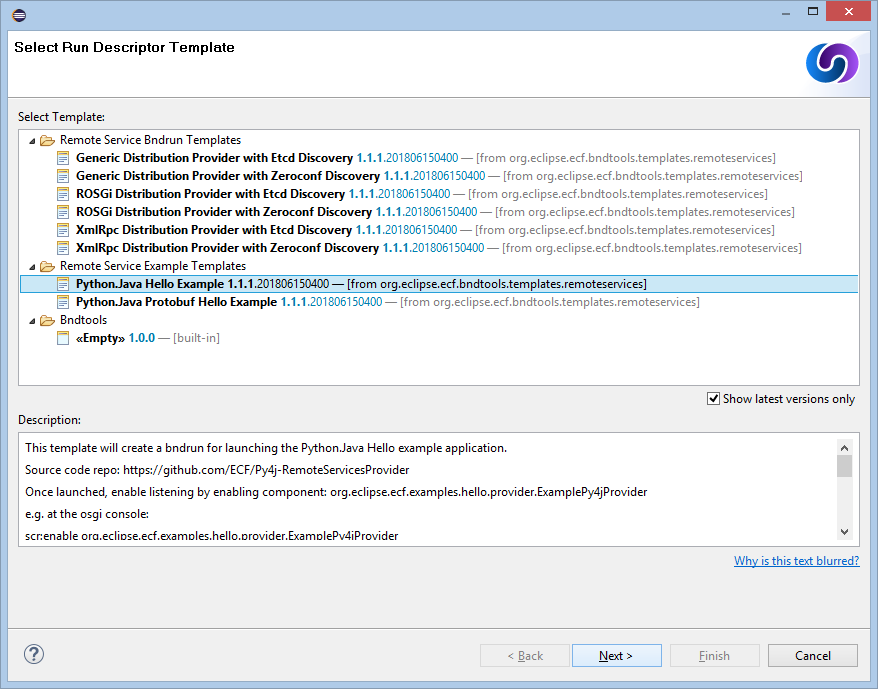Notice: This Wiki is now read only and edits are no longer possible. Please see: https://gitlab.eclipse.org/eclipsefdn/helpdesk/-/wikis/Wiki-shutdown-plan for the plan.
OSGi R7 Remote Services between Python and Java
Contents
Introduction
OSGi Remote Services have traditionally been declared, implemented, and consumed in Java. For example this tutorial. ECF's Photon release, however, includes a new distribution provider for connecting Java/OSGi and Python runtimes.
In addition, a Python implementation of OSGi R7 RSA has recently been contributed to the iPOPO framework. iPOPO is a pure Python implementation of much of OSGi, and iPOPO 0.8.0+ includes a pure-Python implementation of RSA.
This tutorial shows the use of OSGi R7 Remote Services and Python.Java Distribution Provider to expose OSGi remote services both from Java->Python, and Python->Java. The tutorial presents a sample remote service, but developers can use the same mechanisms to expose and consume arbitrary services between Python and Java.
Java Service Declaration
IHello service declaration:
import java.util.concurrent.CompletableFuture; import org.osgi.util.promise.Promise; public interface IHello { String sayHello(String from, String message); CompletableFuture<String> sayHelloAsync(String from, String message); Promise<String> sayHelloPromise(String from, String message); }
IHello source with documentation.
This interface defines one synchronous method sayHello(String from, String message) and two async methods: sayHelloAsync, and sayHelloPromise. These are OSGi R7 asynchronous methods strictly because of the CompletableFuture and Promise return types and the presence of the osgi.async service intent in the Component properties. As per the Async Remote Services specification, return types are interpreted by the distribution provider as async methods, and so will not block the calling thread even if the underlying communication is blocked or fails.
Java Service Implementation
HelloImpl service implementation
@Component(immediate=true,enabled=false,property = { "service.exported.interfaces=*", "service.exported.configs=ecf.py4j.host", "osgi.basic.timeout:Long=50000", "service.intents=osgi.async"}) // osgi.async intent to get the async rs behavior public class HelloImpl implements IHello { @Override public String sayHello(String from, String message) { System.out.println("Java.sayHello called by "+from+" with message: '"+message+"'"); return "Java says: Hi "+from + ", nice to see you"; } @Override public CompletableFuture<String> sayHelloAsync(String from, String message) { System.out.println("Java.sayHelloAsync called by "+from+" with message: '"+message+"'"); CompletableFuture<String> result = new CompletableFuture<String>(); result.complete("JavaAsync says: Hi "+from + ", nice to see you"); return result; } @Override public Promise<String> sayHelloPromise(String from, String message) { System.out.println("Java.sayHelloPromise called by "+from+" with message: '"+message+"'"); Deferred<String> deferred = new Deferred<String>(); deferred.resolve("JavaPromise says: Hi "+from + ", nice to see you"); return deferred.getPromise(); } }
the full HelloImpl source with documentation.
Note the remote service properties specified in the @Component annotation. service.exported.interfaces=* is an OSGi standard property indicating that this service should be exported as a remote service. The service.exported.configs=ecf.py4j.host is another standard property indicating that this service should be exported via the Python.Java distribution provider.
osgi.basic.timeout=Long:50000 indicates that the remote method invocation for all methods in this interface should timeout after 50000ms/50s. This timeout can be set to any desired value and defaults to 30000ms (30s).
The service.intents=osgi.async indicates that the service methods with Promise and CompletableFuture (or Future or CompletionStage) are Async Remote Services and so do not block.
Launching via Bndtools Project Template
With the ECF Photon/3.14.0 release, support has been added for using Bndtools to do remote service development. Before doing the below please use these instructions for setting up a workspace using the ECF/bndtools.workspace template.
1. Create an Empty Bndtools Project in the workspace (of any name).
2. Choose File->New->Run Descriptor File (.bndrun) and select the **Python.Java Hello Example**
3. Choose Next> and give some filename for the .bndrun file
4. Open the created filename.bndrun file.
5. Click the **Resolve** button on the lower right of the bndrun editor underneath the Run Requirements list.
6. Click Finish on the resolve window presented.
7. Click the 'Debug OSGi' link in the upper right of the bndrun editor to start the example.
This should result in some console output similar to
osgi> SLF4J: Failed to load class "org.slf4j.impl.StaticLoggerBinder".
SLF4J: Defaulting to no-operation (NOP) logger implementation
SLF4J: See http://www.slf4j.org/codes.html#StaticLoggerBinder for further details.
Jul 09, 2018 5:06:56 PM py4j.GatewayServer fireServerStarted
INFO: Gateway Server Started
osgi> 17:07:48.611;EXPORT_REGISTRATION;exportedSR={org.eclipse.ecf.examples.hello.IHello}={service.intents=osgi.async, service.exported.configs=ecf.py4j.host, service.id=84, service.bundleid=4, service.scope=bundle, osgi.basic.timeout=50000, component.name=org.eclipse.ecf.examples.hello.javahost.HelloImpl, service.exported.interfaces=*, component.id=6};cID=URIID [uri=py4j://127.0.0.1:25333/java];rsId=1
--Endpoint Description---
<endpoint-descriptions xmlns="http://www.osgi.org/xmlns/rsa/v1.0.0">
<endpoint-description>
.. the rest of the endpoint description
Launching via Apache Karaf
Using Karaf 4.2+ see this page to install ECF Photon into Karaf.
1. Install the Python.Java distribution provider and the Hello example:
karaf@root()>feature:repo-add ecf karaf@root()>feature:repo-refresh ecf karaf@root()>feature:install -v ecf-rs-examples-python.java-hello
This should result in some console output similar to
osgi> SLF4J: Failed to load class "org.slf4j.impl.StaticLoggerBinder".
SLF4J: Defaulting to no-operation (NOP) logger implementation
SLF4J: See http://www.slf4j.org/codes.html#StaticLoggerBinder for further details.
Jul 09, 2018 5:06:56 PM py4j.GatewayServer fireServerStarted
INFO: Gateway Server Started
osgi> 17:07:48.611;EXPORT_REGISTRATION;exportedSR={org.eclipse.ecf.examples.hello.IHello}={service.intents=osgi.async, service.exported.configs=ecf.py4j.host, service.id=84, service.bundleid=4, service.scope=bundle, osgi.basic.timeout=50000, component.name=org.eclipse.ecf.examples.hello.javahost.HelloImpl, service.exported.interfaces=*, component.id=6};cID=URIID [uri=py4j://127.0.0.1:25333/java];rsId=1
--Endpoint Description---
<endpoint-descriptions xmlns="http://www.osgi.org/xmlns/rsa/v1.0.0">
<endpoint-description>
.. the rest of the endpoint description
This output indicates that the HelloImpl service has been registered and exported for remote access from Python.
Launching Python Framework
See this page from the iPOPO documentation for starting the Python-side sample code.

